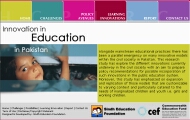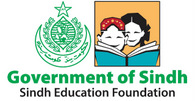Research Publications
Sindh Education Foundation's Education Development and Research Cell undertake research initiatives in order to influence policy decisions. This component has been designed to inspire and communicate systematic research and critical thinking in education and community participation. Its purpose is to foster an exchange of ideas and research findings at a global stage to expand knowledge regarding education & development.
Documenting Educational Innovations in Pakistan
 Although, mainstream educational functions remain shrouded in vicious cycles of access, enrollment, retention and quality, there has been a parallel emergence of many innovative models within public and private education sectors. To explore the different innovations currently underway in education at the national, provincial and grassroots levels, the Sindh Education Foundation (SEF) with support of the Commonwealth Education Fund is conducting
a research study focusing on translation of 'innovative' ideas into educational practices. The innovative models studied will include both indigenous and 'adaptable' frameworks which are specifically catered for the marginalized children and youth of the country.
Although, mainstream educational functions remain shrouded in vicious cycles of access, enrollment, retention and quality, there has been a parallel emergence of many innovative models within public and private education sectors. To explore the different innovations currently underway in education at the national, provincial and grassroots levels, the Sindh Education Foundation (SEF) with support of the Commonwealth Education Fund is conducting
a research study focusing on translation of 'innovative' ideas into educational practices. The innovative models studied will include both indigenous and 'adaptable' frameworks which are specifically catered for the marginalized children and youth of the country.
Led by Mr. Aziz Kabani the research study revolves around innovative models which include both indigenous as well as adaptable/replicable models that have been customized according to the local needs. Innovation at any level of educational context will be reviewed under this proposed study. The research also attempts to look in-depth into the models so as to delve into whether the models carry any meaning or relevance for the beneficiaries. The research will review educational programs initiated both by the government and non- government sector. Research will delve into the link that these models have with formal education and whether they are effective and ensure the aspects of access, retention and quality that have been compromised in mainstream education. The study would also identify the shortcomings of the mainstream education so as to understand the inclusion of innovative models for learning. There would also be policy recommendations that would be made for the inclusion of these models at the district and provincial level of education.
For further information please logon to the innovation in education website
www.sef.org.pk/iie.html
Education for All – A Critical Review
 The World Conference on Education for All, held at Jomtien, Thailand in March 1990, marked a new start in the global quest to universalize basic education and eradicate illiteracy. By the experience of the 10 year period following Jomtien, the Dakar Framework for Action established 6 major EFA goals and outlined 12 strategies in the year 2000. The Government of Pakistan conceptualized the EFA National Plan of Action (2001-2015) based on the Education Sector Reforms (ESR). ESR as a whole is geared towards addressing issues of low enrollment in schooling, educational inequalities by gender and location and lack of access
to schooling. Halfway down the road, it appears that Pakistan will be unable to meet its commitment to ensuring that by 2015, all children, including those belonging to marginalized groups, will have access to free and primary education of good quality.
The World Conference on Education for All, held at Jomtien, Thailand in March 1990, marked a new start in the global quest to universalize basic education and eradicate illiteracy. By the experience of the 10 year period following Jomtien, the Dakar Framework for Action established 6 major EFA goals and outlined 12 strategies in the year 2000. The Government of Pakistan conceptualized the EFA National Plan of Action (2001-2015) based on the Education Sector Reforms (ESR). ESR as a whole is geared towards addressing issues of low enrollment in schooling, educational inequalities by gender and location and lack of access
to schooling. Halfway down the road, it appears that Pakistan will be unable to meet its commitment to ensuring that by 2015, all children, including those belonging to marginalized groups, will have access to free and primary education of good quality.
To analyze the situation in Sindh, vis-à-vis implementation of EFA strategies, a research grant was awarded to the Sindh Education Foundation by the Commonwealth Education Fund. The research study was conducted to evaluate the framework and application of EFA and its impact on the quality of education in Pakistan, particularly in Sindh. The main focus of the study was to gauge the impact of EFA on the quality of education.
For further information please logon to the education for all website
www.sef.org.pk/efa.html
Jandi Art: At the Crossroads
The province of Sindh in Pakistan is famous for its rich culture and diverse crafts. Amongst the numerous traditional forms of art, Jandi (lacquer work on wood) has been of particular identification for the area and a source of livelihood and sustenance for artisans and their families for many years. The Sindh Education Foundation (SEF) is committed to endorsing the richness of indigenous knowledge and advocating the necessity of preserving and promoting it. The SEF studied Jandi art and artisans living in Hala in order to get an insight into the history of the art, its process of production and to highlight the artisans' experiences and concerns. Several factors that threaten the craft and the artisan's livelihood were cited and key recommendations were provided for greater development of the handicraft in order to salvage a beautiful cultural practice from extinction.
Download StudyUnderstanding ECD through Practice: An Exploratory Study with ECD Teachers in Pakistan
 Besides parents, teachers are deemed as most important contributing factor in bringing about any meaningful transformation in early childhood related programs. Hence, in RCC program capacity building of teachers is a critical part of program success, as teachers are perhaps the most visible catalyst for change in the classroom/school. It is endeavored that through training and follow-up, teachers will gain understanding of child centered concepts and new pedagogical techniques that allow children to explore their self-confidence and creativity in a safe environment,
Besides parents, teachers are deemed as most important contributing factor in bringing about any meaningful transformation in early childhood related programs. Hence, in RCC program capacity building of teachers is a critical part of program success, as teachers are perhaps the most visible catalyst for change in the classroom/school. It is endeavored that through training and follow-up, teachers will gain understanding of child centered concepts and new pedagogical techniques that allow children to explore their self-confidence and creativity in a safe environment,
instigating a positive change in classroom environments and in student achievements and enrollments. The teacher training programs by the Aga Khan Education Service, Pakistan (AKES, P) and Teachers' Resource Center (TRC) entailed a framework that emphasized more on the deeper understanding of ECD concepts and related practices instead of focusing only at the mere transference of mechanical training components in the classroom. Observations and reflections from the field do indicate that these models of teacher development have helped in creating better understanding amongst teachers along with generating creativity not only in children but the teachers as well, resulting in a vibrant learning environment.
This research further explores the notion of how successfully the ECD concepts have been implemented in the classroom/schools since capacity development of the teachers in ECD concepts has been one of the fundamental tasks in the RCC programme. AKF with the financial assistance of the USAID and technical support of partner NGOs invested substantial resources to develop the capacity of RCC school teachers and ECD support teacher (known as community teacher), selected from the community. Teacher Resource Center conducted training for HANDS and SOCIETY whereas AKES, P conducted training for their RCC school teachers. Through intensive training workshops, ensued by field based support and follow up visits, ECD concepts and their implementation techniques were communicated to teachers. Although, the documentation at different levels such as the reflections on the training process, the reports of implementing partners' continuous interaction with schools and the comparative analysis of baseline and the monitoring data, suggests that the capacity building initiatives have helped the teachers to understand ECD concepts and the corresponding teaching methodologies. For example a considerable improvement can be observed in the monitoring data vis-à-vis teachers' administration of child-centered pedagogy as compared to baseline. However, hitherto, no study was conducted directly with teachers to explore/document their perception of learning ECD concepts, the articulation of these concepts and their experiences of translating these concepts into classroom practices and their impact on children's learning/development1. This study attempts to explore all these areas. Some of the findings of this study are summarized in the following sections along with the methodology and sampling details.
Understanding School Dropout: A Case Study
 The Paper presents the case study of a village school in Sindh which experiences high absenteeism and dropout rate during an academic cycle. Study findings will help in understanding of the real scope of the dropout problem so that appropriate solutions become apparent and policy interventions turn out more meaningful.
The Paper presents the case study of a village school in Sindh which experiences high absenteeism and dropout rate during an academic cycle. Study findings will help in understanding of the real scope of the dropout problem so that appropriate solutions become apparent and policy interventions turn out more meaningful.
Download Study
Dialogue on Governance of Education in Sindh: A Synopsis
 The Synopsis of SEF and AKU-IED's Dialogue on Governance of Education in Sindh documents recommendations by experts in the field of education, policy, planning and development. Specifically with the introduction of the 18th Constitutional Amendment – Article 25-A – this synopsis presents a roadmap which will facilitate improvement in the state of education in the provinces.
The Synopsis of SEF and AKU-IED's Dialogue on Governance of Education in Sindh documents recommendations by experts in the field of education, policy, planning and development. Specifically with the introduction of the 18th Constitutional Amendment – Article 25-A – this synopsis presents a roadmap which will facilitate improvement in the state of education in the provinces.
Download Publication





